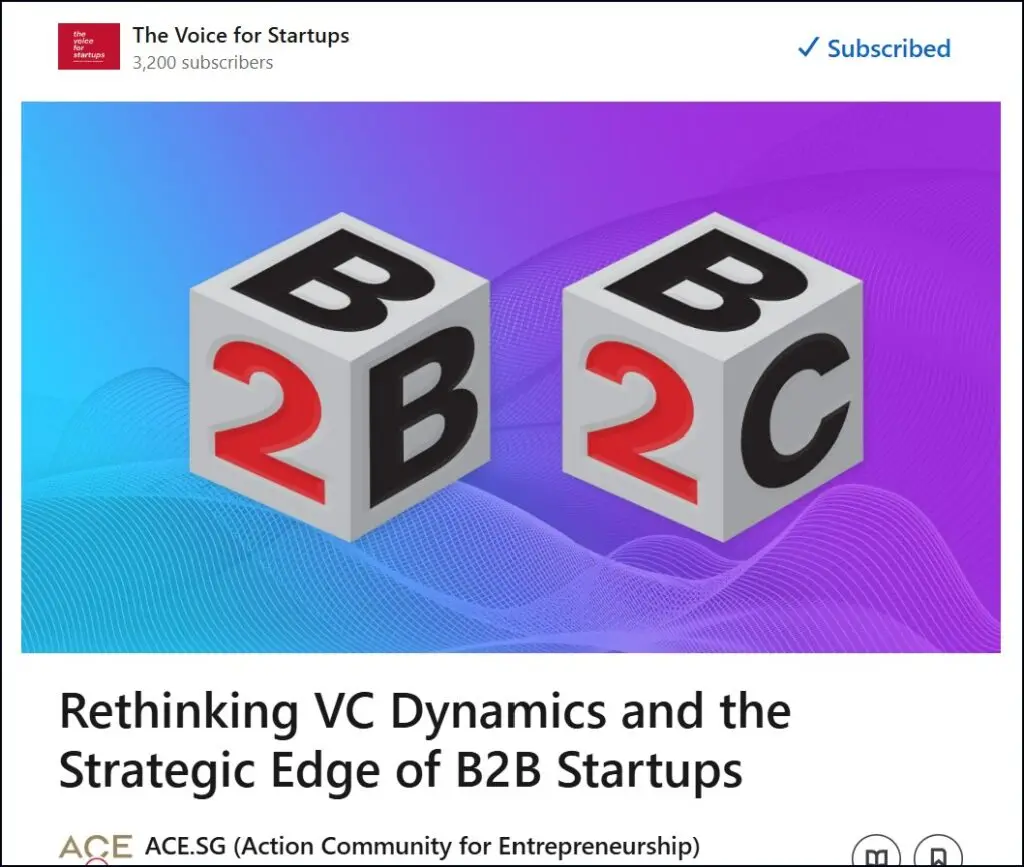Unlocking Long-Term Success with a Blend of Coaching and Mentoring
Article commented by: YK Png. Certified Coach & Trainer.

Reference: https://www.linkedin.com/feed/update/urn:li:activity:7223586654081404928/?actorCompanyId=99240217
Key Takeaways from the article:
The Non-Obvious Truth About VCs and Founders
1. Founders as Customers of VCs: John Tan, CEO of Doyobi, posits that founders, not LPs, are the true customers of venture capitalists (VCs). This perspective highlights the essential role founders play in the existence and success of the venture capital industry.
2. Challenging the Traditional Narrative: Traditionally, the narrative has focused on founders chasing after investors. This new viewpoint suggests that founders should also vet VCs, emphasizing a mutual selection process.
3. The Bidirectional Challenge: Both founders and VCs face challenges in their respective roles. Founders need to identify groundbreaking ideas, while VCs must pinpoint potential winners. This mutual difficulty underscores the importance of due diligence from both parties.
4. Fundraising Difficulties: In current times, both founders and VCs struggle with fundraising. This fresh perspective can be particularly beneficial, offering a balanced view of the risks and efforts involved on both sides.
Why B2B Startups Are Backable?
1. Large Addressable Market: B2B startups often have a significant market size, making them attractive to investors.
2. High Growth and Visibility: Despite longer sales cycles, B2B companies can achieve high growth and maintain visibility.
3. Long-Term Benefits: Building a B2B company from scratch may be challenging, but it can lead to substantial long-term benefits such as stickier contracts and lower churn rates.
4. Lower Competition: The B2B space tends to be less competitive than B2C, allowing multiple companies to succeed without needing majority market share.
5. Higher Margins and Resilience: B2B companies generally enjoy larger margins and more resilient business models, which can be particularly advantageous during tough fundraising periods.
6. Consideration Before Building: While B2C startups can be highly successful, it’s crucial to understand the unique challenges and benefits of both B2B and B2C models before deciding which path to pursue.
As a certified coach at CoachToring.Com, I’ve seen firsthand the value of understanding the nuanced differences in our professional journeys. Today, I want to share two insightful perspectives from this article “Rethinking VC Dynamics and the Strategic Edge of B2B Startups”, that impact how we view venture capital and startup strategies.
* The Non-Obvious Truth About VCs and Founders:
John Tan, CEO of Doyobi, recently shared a compelling view: founders are the real customers of venture capitalists, not LPs. This flips the traditional script of founders chasing after investors and suggests that VCs need founders just as much. It’s a refreshing reminder for founders to also do their homework on VCs. Mutual diligence is crucial because the challenge of betting on outliers cuts both ways. This perspective is especially pertinent in today’s challenging fundraising environment, where both founders and VCs struggle to secure the necessary funds.
* Why B2B Startups Are Backable?
On another note, while B2C startups often grab headlines, B2B companies quietly build resilient and profitable businesses. B2B startups, despite longer sales cycles and initial challenges, enjoy larger margins, lower churn rates, and less intense competition. They can achieve sustainable growth without needing to dominate the market, as seen with multiple successful cybersecurity firms like Crowdstrike, Trend Micro, and McAfee.
Understanding these dynamics can help entrepreneurs make informed decisions about the type of company they want to build.
In my journey as a certified coach, I’ve blended coaching and mentoring, supported by proven theories – what I call “coachtoring” – to help individuals navigate these complexities. For instance, I once worked with the founders of a new innovation in deep tech who were struggling with defining their business models. Through the coachtoring approach, I helped the team identify their problem statement, value proposition, and market strategy. This holistic approach not only addressed immediate issues but also built a foundation for long-term success.
Whether you’re building a startup or advancing in your career, it’s not just about achieving short-term goals; it’s about creating lasting impact. That’s the essence of coachtoring.
~YK Png. Freelance Regulatory Pharmacist. (FPSS. PCTC. ACLP.)
www.PharmacistCoaches.com
www.CoachToring.com
#VentureCapital #Startups #Coaching #Mentoring #Leadership #B2B #B2C #Entrepreneurship #Coachtoring #LeadershipDevelopment NUS Graduate Research Innovation Programme (GRIP), NUS Master of Science in Venture Creation (The NUS MSVC)

